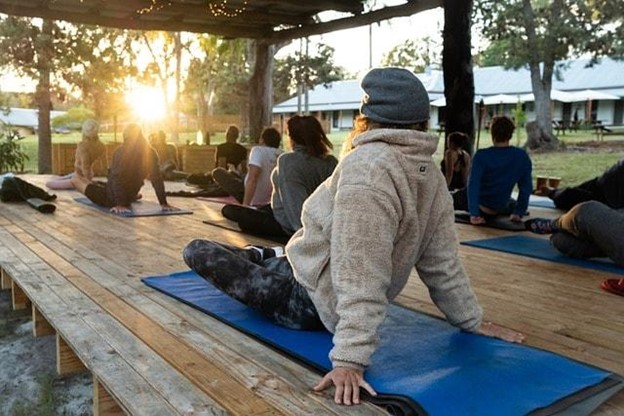In today’s fast-paced world, finding time to focus on your well-being can be a challenge. For those struggling with substance abuse or mental health challenges, traditional treatment programs might not always offer the environment or approach needed to truly heal.
This is where rehab retreats come in – specialized programs designed to combine intensive therapy with a serene and supportive setting.
These retreats provide comprehensive care and personalized support through addiction treatment, incorporating both medical and holistic approaches to address the unique needs of each client while promoting a drug-free lifestyle.
But what exactly is a rehab retreat, and how does it differ from standard rehabilitation programs?
In this blog, we’ll explore the concept of rehab retreats, their benefits, and what makes them unique. Whether you’re looking for upscale treatment in the Peach State or considering a secluded rehab retreat setting, understanding these programs can help you make an informed decision.
What is a Rehab Retreat?
A rehab retreat is a holistic and immersive treatment program that offers comprehensive support for individuals dealing with drug and alcohol addiction, mental health issues, or both.
Unlike traditional rehab facilities, which are often clinical in nature, rehab retreats emphasize a more therapeutic and tranquil environment.
These retreats typically take place in serene locations, such as the mountains, by the beach, or in secluded natural settings. This peaceful backdrop is intentionally chosen to promote relaxation, reflection, and healing.
Definition and Purpose
A rehab retreat is a specialized treatment center designed to provide a nurturing and supportive environment for individuals grappling with substance abuse, addiction, and mental health issues. The primary purpose of a rehab retreat is to offer a comprehensive approach to managing substance use disorders, promoting long-term recovery, and enhancing overall mental health and well-being.
These retreats blend evidence-based therapies with holistic approaches, creating a nurturing environment that helps individuals overcome addiction and achieve a healthier lifestyle. By focusing on the mind, body, and spirit, rehab retreats aim to foster deep healing and lasting recovery.
Key Features of a Rehab Retreat:
- Customized Treatment Plans: Tailored to meet the specific needs of each individual.
- Holistic Therapies: Programs often include yoga, meditation, art therapy, and fitness activities.
- Luxury Accommodations: High-end amenities to create a comfortable and stress-free experience.
- Small Group Sizes: Personalized attention with lower patient-to-staff ratios.
- Secluded Locations: Privacy and tranquility to foster deep healing.
- Drug Detox Programs: Essential step in the recovery process, providing a supportive environment for detoxification.
Types of Rehab Retreats
There are various types of rehab retreats, each catering to different needs and preferences. Some common types include:
- Luxury Rehab Retreats: These retreats offer high-end amenities and services, such as spas, yoga classes, and gourmet meals, providing a comfortable and stress-free environment for recovery.
- Holistic Rehab Retreats: Focusing on alternative therapies, these retreats incorporate practices like acupuncture, meditation, and herbal remedies to promote healing and well-being.
- Inpatient Rehab Retreats: Providing 24/7 medical supervision and support, these retreats are ideal for individuals requiring intensive treatment and constant care.
- Residential Treatment Centers: Offering a home-like environment, these centers provide a supportive space for individuals to receive treatment and support while living on-site.
- Outpatient Rehab Retreats: These retreats offer flexible treatment options for individuals who cannot commit to inpatient programs, allowing them to receive care while maintaining their daily responsibilities.
Each type of rehab retreat offers unique benefits, allowing individuals to choose the best fit for their specific needs and preferences.
Benefits of Choosing a Rehab Retreat

1. Enhanced Focus on Recovery
The secluded nature of rehab retreats minimizes distractions from the outside world, allowing individuals to fully concentrate on their recovery journey. This is especially beneficial for those who might struggle to focus in traditional settings.
2. Comprehensive Care for Substance Abuse
Rehab retreats often provide a blend of evidence-based therapies, such as cognitive-behavioral therapy (CBT) and group counseling, alongside holistic approaches. This comprehensive care addresses both the physical and emotional aspects of drug abuse, addiction, and mental health.
3. Supportive Environment
Being surrounded by like-minded individuals and compassionate professionals creates a sense of community for those struggling with alcohol addiction. This supportive network can be crucial in fostering long-term recovery.
4. Luxury and Comfort
Upscale amenities and personalized services make the experience more inviting. From gourmet meals to spa treatments, rehab retreats prioritize comfort as part of the healing process.
2.5 5. Long-Lasting Impact for Long Term Recovery
The tools and coping mechanisms learned during a rehab retreat can be applied long after the program ends, helping individuals maintain sobriety and mental wellness.
Who Can Benefit from a Rehab Retreat?
Rehab retreats are ideal for individuals who:
- Prefer a private and discreet treatment option.
- Seek a holistic approach to recovery.
- Value luxury and comfort as part of their healing process.
- Require a tailored program that addresses co-occurring mental health issues.
- Need a break from stressful environments to focus on personal growth.
How Does a Rehab Retreat Differ from Traditional Rehab?

1. Location and Setting
Traditional rehab facilities are often located in urban or clinical environments. In contrast, rehab retreats prioritize serene, secluded settings that encourage relaxation and introspection.
2. Approach to Mental Health Treatment
While traditional rehabs focus primarily on evidence-based treatments, rehab retreats integrate holistic practices that address the mind, body, and spirit, providing comprehensive mental health treatment that combines addiction recovery with emotional well-being.
3. Group Size
Rehab retreats typically have smaller group sizes, allowing for more personalized attention and stronger connections with therapists and peers.
4. Amenities
Luxury accommodations and activities, such as hiking, yoga, or equine therapy, are common in rehab retreats but less so in traditional rehab settings.
Aftercare programs specifically designed for patients recovering from opiate addiction provide essential support and guidance post-detox, allowing individuals to regain both physical and emotional strength to live a life free from opioid dependency.
5. Privacy
For those seeking discreet treatment, rehab retreats provide a higher level of confidentiality and seclusion.
What to Expect During Treatment
During treatment at a rehab retreat, individuals can expect a comprehensive and supportive environment that addresses their physical, emotional, and mental health needs. The treatment process typically includes:
- Initial Assessment and Evaluation: A thorough assessment to determine the best course of treatment tailored to individual needs.
- Personalized Treatment Plan: Development of a customized plan that includes evidence-based therapies and holistic approaches.
- Evidence-Based Therapies: Incorporation of therapies such as cognitive-behavioral therapy (CBT) and medication-assisted treatment (MAT) to address addiction and mental health issues.
- Holistic Therapies: Inclusion of practices like yoga, meditation, and art therapy to promote overall well-being.
- Group and Individual Counseling: Regular sessions to provide emotional support and address underlying issues.
- Family Therapy and Support: Involvement of family members in the treatment process to foster a supportive network.
- Aftercare Planning and Support: Development of a plan to ensure long-term recovery and continued support after leaving the retreat.
This comprehensive approach ensures that individuals receive the care and support they need to achieve lasting recovery.
Detox and Withdrawal Support
Detox and withdrawal support are critical components of rehab retreats, especially for individuals struggling with substance use disorders.
Rehab retreats provide a safe and supportive environment for individuals to undergo detoxification and manage withdrawal symptoms. The detox process typically includes:
- Medical Supervision and Support: Continuous medical oversight to manage withdrawal symptoms and ensure safety.
- Medication-Assisted Treatment (MAT): Use of medications to alleviate withdrawal symptoms and reduce cravings.
- Holistic Therapies: Incorporation of practices like acupuncture and massage to promote relaxation and reduce discomfort.
- Nutritional Support and Counseling: Guidance on healthy eating habits to support overall well-being.
- Emotional Support and Counseling: Addressing underlying issues contributing to addiction through therapy and counseling.
By providing comprehensive detox and withdrawal support, rehab retreats ensure a safe and comfortable detox process, setting the foundation for successful addiction recovery.
Choosing the Right Rehab Retreat
When selecting a rehab retreat, consider the following factors:
- Location: Does the setting align with your preferences (e.g., beach, mountains)?
- Treatment Focus: Does the retreat specialize in treating your specific needs?
- Amenities: Are luxury accommodations and activities important to you?
- Cost: Does the program fit within your budget?
- Accreditation: Is the facility licensed and accredited?
For example, if you’re seeking upscale treatment in the Peach State, you might look for a rehab retreat that combines high-quality care with the serene landscapes Georgia has to offer.
Alternatively, those wanting a secluded rehab retreat setting might prioritize programs located in remote areas.
Getting Help at a Rehab Retreat Holds Appeal for Many
Rehab retreats offer a unique blend of intensive therapy and holistic care in tranquil, luxurious settings. Whether you’re seeking upscale treatment in the Peach State or desire a secluded rehab retreat setting, these programs provide a supportive environment to heal and grow.
By prioritizing your well-being and exploring tailored treatment options, you can take the first step toward a healthier, more fulfilling life.
FAQs About Rehab Retreats
What types of therapy are offered at rehab retreats?
Rehab retreats typically offer a combination of evidence-based therapies (such as CBT, DBT, and group counseling) and holistic treatments (such as yoga, meditation, and art therapy).
Are rehab retreats effective?
Yes, rehab retreats can be highly effective, especially for individuals seeking a more personalized and holistic approach to recovery. The tranquil environment and comprehensive care often lead to lasting results.
How long does a rehab retreat last?
The duration varies but typically ranges from a few weeks to several months, depending on individual needs and program offerings.
Are rehab retreats covered by insurance?
Some rehab retreats accept insurance, but coverage varies. It’s essential to check with the facility and your insurance provider.
What makes a rehab retreat different from a vacation?
While rehab retreats may offer luxurious settings and activities, they are focused on intensive therapy and recovery, unlike vacations, which are purely for leisure.










